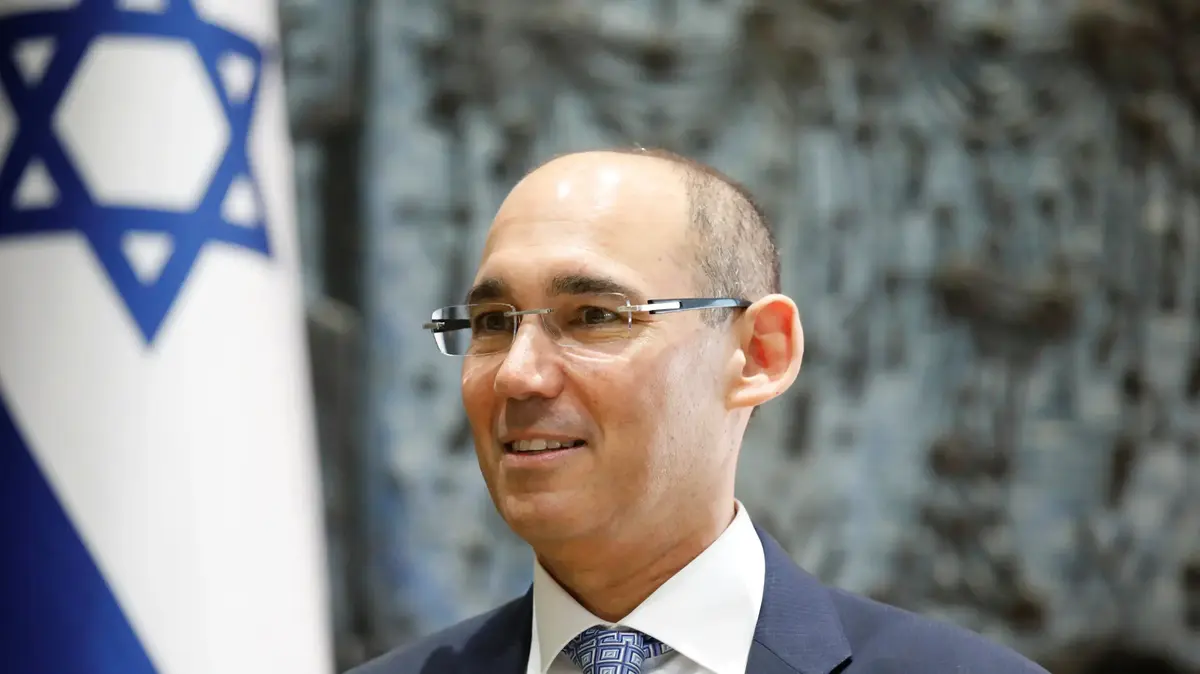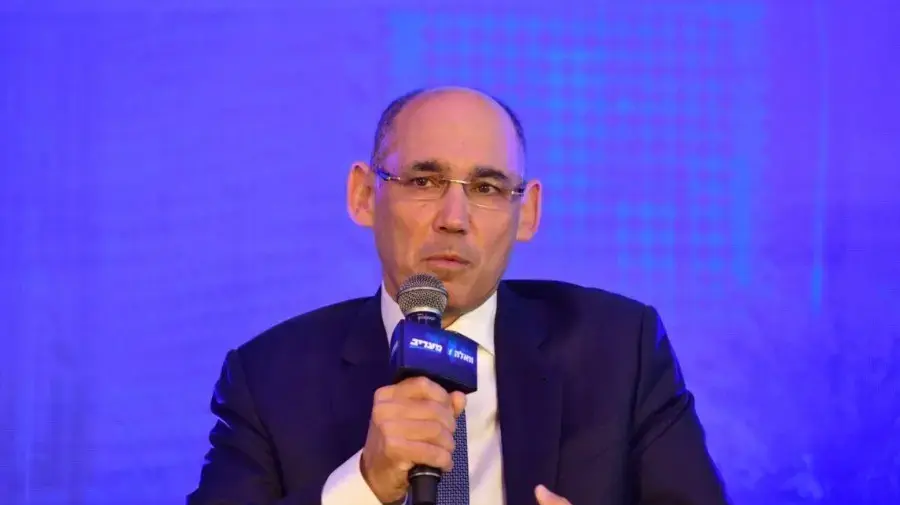- Business
- news
A crisis of the century: Where has the Governor of the Bank of Israel gone?
The plan he prepared for the government was shelved, the news of a grant for every citizen he heard from the media, and relations with Netanyahu who appointed him are far from warm. The Governor of the Bank of Israel, Amir Yaron, was also supposed to be the Economic Adviser to the Prime Minister, but as the crisis progressed, his influence diminished.
Tags- Amir Yaron
Amiram Barkat
Sunday, 23 August 2020, 06:02- Share on Facebook
- Share on WhatsApp
- Share on general
- Share on general
- Share on Twitter
- Share on Email
He has been calling on the government for two months to approve the budget immediately, he warns of the economic consequences of holding elections, he opposes the continued use of the out-of-budget box method; He repeats that it is impossible to increase the deficit without limit.
A review of his statements from recent weeks shows that the Governor of the Bank of Israel, Amir Yaron, is increasing his critical tone towards the government's actions and failures. The highlight was his announcement that further elections would be bad news for the Israeli economy, a very unusual statement for a senior non-elected official.
But despite the escalation in tone, criticism of the governor also seems to be growing as the crisis lengthens. It seems that it can be summed up in the heard argument that he does not play the role of the responsible adult who navigates the economy during the crisis - as Stanley Fisher did in the 2008 crisis.
More on Walla! NEWS
Raspberries that can be devoured, animals and urban nature: We went to visit the Azure Valley
In collaboration with the JNFTo the full article
Still waters run deep? Amir Yaron (Photo: Reuters)"Silent water penetrates deep," said his predecessor, Governor of the Bank of Israel Prof. Yaakov Frenkel, in an interview with Channel 12. Asked if the governor should not knock on the table when he has criticism of government and finance moves, Frenkel replied: "His criticism and contribution is made in my room Rooms. " "We are much more influential full-influencers," the Bank of Israel says when asked about this in private conversations.
But in the test of the result, half a year since the outbreak of the crisis, there is still no significant policy move registered in Yaron's name in the field of economic advice to the government. A comprehensive economic plan prepared by the Bank of Israel for the purpose of presenting to the government was not presented in the end. On the other hand, there are moves that were made against his will, and one notable move - the distribution of a grant to every citizen - was done contrary to the opinion of the governor who was not even updated on it and he heard about it in the media.
Relations with the man who elected him to the post, Prime Minister Benjamin Netanyahu, began out of great mutual appreciation, but today are defined as "normal" only. Government ministers say, Shiron "We will not say dominant. He is not an economic leader like Stanley Fischer - in his ability to conduct himself politically. It is impossible to succeed without being a bit of a politician."
At the professional level in the Treasury, the natural allies of the Bank of Israel claim that the governor is unable to choose a side and "should decide whether he is sitting in the stands or playing on the field."
It is true that Shiron reached the biggest crisis in the last hundred years with the background of an academic from the USA, and barely had time to gain experience in the asylum called Israeli politics, but crises are also an opportunity to build leadership. And today, Yaron's influence in internal decision-making circles grinding.
Beginning of the crisis: The governor is active, but his influence is slowly diminishing
The role of economic adviser to the government is just one of the roles of the governor. His other hats are in front of the financial system and capital markets, where the governor leads a successful policy overall and effective. He rushed to summon the heads of the banks to him at the beginning of the crisis, called on them to get under the stretcher and eased the capital adequacy ratio to release credit to consumers. He then led the Bank of Israel's response to the financial crisis.
The Bank of Israel responded to the acute suffocation that developed in foreign currency by opening liquidity channels to financial entities. The rapid action, together with similar actions taken by the Fed and other central banks, led to a rapid stabilization of the markets.
Another channel in which progress has been made is the ongoing monitoring of economic activity in the economy. At the beginning of the crisis, the Bank of Israel created a "bank" of rapid indicators of economic activity based on expenditures on credit cards, electricity consumption and mobility indices based on mobile phones.
The role of economic adviser to the government seemed to Liron at the beginning as a kind of anomaly (of the governors of the central banks in the West, only the Israeli officially holds this position), but in retrospect the crisis actually sharpened the importance of the role. To Yaron, to his credit, he felt the weight of responsibility from the first moment. He decided at the beginning of the crisis on a proactive strategy, not to settle for the role of the proving academic at the gate, but to "put his hands deep in the mud" as he defined it and try and influence economic policy.
At the beginning of the crisis, Yaron was one of the leaders in the line in the government, which opposes the closure and calls on the government to adopt an aggressive policy of helping the economy. The first aid program in the amount of NIS 80 billion was closed in a nightly discussion, which Shiron hosted in his office. The folklore of that meeting will recall the fact that Shiron ordered pizzas for the participants. But as the crisis lengthened, the informal atmosphere of emergency dissipated and the cracks began to appear. From then on, the influence of the governor, despite his statements, disappeared.
The first crack: archiving the governor's economic plan
The first crack concerns the archiving of a comprehensive economic plan prepared by the Bank of Israel to rescue the economy from the crisis. Yaron presented this plan to Netanyahu, but it was never presented to the government. The reason for this was Finance Minister Israel Katz, who was furious that the Bank of Israel and MK Nir Barkat were presenting their own plans to rescue the economy and demanded that Netanyahu shelve them. Katz called these plans "background noises", drawing an equal cut between a political plan and a plan The Central Bank of Israel
However, it should be noted that elements of the bank's plan were eventually incorporated into the finance plans. Only on one issue, the grants for the self-employed, was a decision made that was not to Yaron's liking.
The second crack: conflicts with the professional echelon in the Treasury
The second crack created is in the relationship between the Bank of Israel and the professional echelon in the Treasury. These cracks erupted on the surface in a briefing for reporters, in which senior finance officials accused the Bank of Israel of unprofessionalism, adding nicknames such as "neither adult nor irresponsible," and "the last of the forts fell."
All the governors of the central bank had frictions and confrontations with the finance ministers who served against them, but the professional echelon in the treasury was considered a natural ally of the central bank. Although the briefing of senior finance officials came in response to a relatively marginal detail in the financial stability report published by the bank, it expressed deeper deposits towards the governor that accumulated during the crisis months.
This bitterness stems from cases where the governor did not back the treasury in economic discussions in the government, even though the parties had previously coordinated with each other. In general, the Treasury claims that they do not know which side the governor is on, whether he is "playing on the field or sitting in the podium, and if plans are expected with him from the Bank of Israel to back them up." The Bank of Israel has previously said that the Treasury was in no hurry to change the disk and understand that the crisis necessitates changing the rules of the game.
The feeling at the Bank of Israel is that if the Treasury had responded more quickly and effectively, it is possible that controversial moves such as the grant to every citizen would never have come about.
The third crack: a cold shoulder from the Prime Minister
The third crack concerns relations with the prime minister and chairman of the National Economic Council, Prof. Avi Simhon. Simhon was the man who recommended Netanyahu to Yaron, and Netanyahu chose him with great enthusiasm over other candidates presented to him. Perhaps that is why the fact that Netanyahu and Simhon chose not to share the adviser the government's economic program grant every citizen presented.
Yaron did not hide his criticism of him on the program, which focuses on that money is not divided in a focused and effective enough in his opinion. when asked in an interview with army Radio what feeling that Netanyahu and Simhon ignored, said Yaron evasion "We are Around the table all the way, "and" we were also in preliminary discussions about the next step that I define as an acceleration program. "
Along with all these challenges, Yaron also had to deal with a militant workers' committee at the Bank of Israel. "There are some things I was not told before I took office," he said in the same interview at the GLC, "that the world is about to face the biggest economic crisis since the second half of the last century, and that I will have to devote a considerable part of my time to dealing with workers." The economic. "
Governor's side: Criticism? Better than sitting in the ivory tower
The governor's entourage says that "the best evidence of the influence and functioning of the Governor of the Bank of Israel and the Bank of Israel is that all parties take for granted the fact that the markets are functioning properly, the interest rate environment is comfortable and the currency is stable; hundreds of thousands of households and businesses have rejected their mortgages and loans. The stock market is functioning with raising capital for companies after the bank purchased government and corporate bonds, etc. "
Regarding the governor's role, it is said in his environment that" the role of economic adviser has been particularly emphasized in the campaign since the outbreak of the corona crisis. The changing political circumstances, which are given to the governor, make him more complex on the one hand, but emphasize him on the other. "
According to sources in the governor's environment," the governor would probably have received higher returns if he had stayed in his ivory tower and settled the interest rate and stabilized markets. But then he was turning his back on the professional integrity of his mission imposed on him - put their hands deep into the mud, and continue to act, in every possible way, to influence the government's economic policies designed to reduce the irreversible damage of the financial crisis. "
Regarding the claim about the erosion effect of the Governor People around him say that "True, not everything he wants is happening, but it's still not a good enough reason to be back in his office. And at the same time, when there are measures that in his perception are financially incorrect, the governor did not hesitate and came out against them in his voice and name, and in real time.
"The bottom line," the governor's entourage concludes, "is that the Bank of Israel has a dramatic impact today on economic policy strategy and also on the operational measures taken to alleviate the crisis, and this is also true in the development of the 'traffic light' model for examining morbidity in localities."
The governor's entourage adds that he "accepts the criticism that he is not satisfied with proof at the gate. He prefers to come down from his spacious office on the 7th floor of the Bank of Israel building, act, argue and influence. He prefers to act day and night to influence economic policy, because he remembers "Behind the numbers and the data, there are people who expect economic leadership, and for whom he works."
- Share on Facebook
- Share on WhatsApp
- Share on general
- Share on general
- Share on Twitter
- Share on Email















